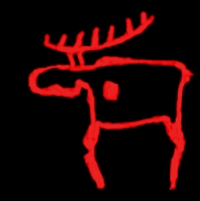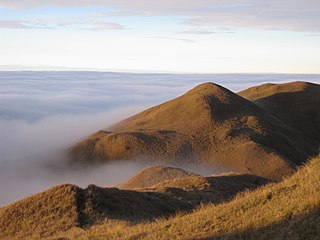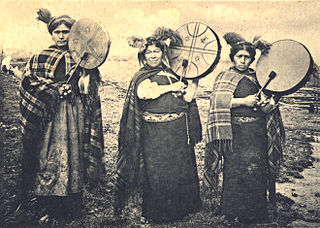Related Research Articles
Animism is the belief that objects, places, and creatures all possess a distinct spiritual essence. Animism perceives all things—animals, plants, rocks, rivers, weather systems, human handiwork, and in some cases words—as being animated, having agency and free will. Animism is used in anthropology of religion as a term for the belief system of many Indigenous peoples in contrast to the relatively more recent development of organized religions. Animism is a metaphysical belief which focuses on the supernatural universe : specifically, on the concept of the immaterial soul.

A demon is a malevolent supernatural entity. Historically, belief in demons, or stories about demons, occurs in religion, occultism, literature, fiction, mythology, and folklore; as well as in media such as comics, video games, movies, and television series.

Heaven, or the heavens, is a common religious cosmological or transcendent supernatural place where beings such as deities, angels, souls, saints, or venerated ancestors are said to originate, be enthroned, or reside. According to the beliefs of some religions, heavenly beings can descend to Earth or incarnate and earthly beings can ascend to Heaven in the afterlife or, in exceptional cases, enter Heaven without dying.
Pre-existence, preexistence, beforelife, or premortal existence, is the belief that each individual human soul existed before mortal conception, and at some point before birth enters or is placed into the body. Concepts of pre-existence can encompass either the belief that the soul came into existence at some time prior to conception or the belief that the soul is eternal. Alternative positions are traducianism and creationism, which both hold that the individual human soul does not come into existence until conception or later. It is to be distinguished from preformation, which is about physical existence and applies to all living things.

Reincarnation, also known as rebirth or transmigration, is the philosophical or religious concept that the non-physical essence of a living being begins a new life in a different physical form or body after biological death. In most beliefs involving reincarnation, the soul of a human being is immortal and does not disperse after the physical body has perished. Upon death, the soul merely becomes transmigrated into a newborn baby or an animal to continue its immortality. The term transmigration means the passing of a soul from one body to another after death.
A creator deity or creator god is a deity responsible for the creation of the Earth, world, and universe in human religion and mythology. In monotheism, the single God is often also the creator. A number of monolatristic traditions separate a secondary creator from a primary transcendent being, identified as a primary creator.
In Fijian mythology, Degei, enshrined as a serpent, is the supreme god of Fiji. He is the creator of the (Fijian) world, fruits, and of men and is specially connected to Rakiraki District, Fiji. He judges newly dead souls after they pass through one of two caves: Cibaciba or Drakulu. A few he sends to paradise Burotu. Most others are thrown into a lake, where they will eventually sink to the bottom (Murimuria) to be appropriately rewarded or punished.

Saṃsāra is a Pali and Sanskrit word that means "wandering" as well as "world," wherein the term connotes "cyclic change" or, less formally, "running around in circles." Saṃsāra is referred to with terms or phrases such as transmigration/reincarnation, karmic cycle, or Punarjanman, and "cycle of aimless drifting, wandering or mundane existence". When related to the theory of karma it is the cycle of death and rebirth.

Finnic paganism was the indigenous pagan religion in Finland, Karelia, Ingria and Estonia prior to Christianisation, the religion was native to the Baltic Finnic peoples. It was a polytheistic religion, worshipping a number of different deities. The principal god was the god of thunder and the sky, Ukko; other important gods included Jumo (Jumala), Ahti, and Tapio. Jumala was a sky god; today, the word "Jumala" refers to all gods in general. Ahti was a god of the sea, waters and fish. Tapio was the god of forests and hunting.

Philippine mythology is rooted in the many indigenous Philippine folk religions. Philippine mythology exhibits influence from Indonesian, Hindu, Muslim, Shinto, Buddhist, and Christian traditions.

Indigenous Philippine folk religions are the distinct native religions of various ethnic groups in the Philippines, where most follow belief systems in line with animism. Generally, these Indigenous folk religions are referred to as Anito or Anitism or the more modern and less ethnocentric Dayawism, where a set of local worship traditions are devoted to the anito or diwata, terms which translate to gods, spirits, and ancestors. 0.23% of the population of the Philippines are affiliated with the Indigenous Philippine folk religions according to the 2020 national census, an increase from the previous 0.19% from the 2010 census.
In Jainism, godliness is said to be the inherent quality of every soul. This quality, however, is subdued by the soul's association with karmic matter. All souls who have achieved the natural state of infinite bliss, infinite knowledge, infinite power and infinite perception are regarded as God in Jainism. Jainism rejects the idea of a creator deity responsible for the manifestation, creation, or maintenance of this universe. Instead, souls who have reached Heaven for their merits and deeds influence the Universe for a fixed period until they undergo reincarnation and continue the cycle of enlightenment. According to Jain doctrine, the universe and its constituents have always existed. All constituents and actions are governed by universal natural laws and "perfect soul".
Guf is a Hebrew word, meaning "body". In Jewish mysticism the Chamber of Guf, also called the Otzar, is the Treasury of Souls, located in the Seventh Heaven.

The religion of the indigenous Mapuche people of south-central Chile and southwestern Argentina is an extensive and ancient belief system. Legends and myths are common to the various groups that make up the Mapuche people. These myths tell of the creation of the world and the various deities and spirits that reside in it.

Religiously, Fiji is a mixed society, with Christianity and Hinduism being the main faiths.
According to Jain doctrine, the universe and its constituents—soul, matter, space, time, and principles of motion—have always existed. Jainism does not support belief in a creator deity. All the constituents and actions are governed by universal natural laws. It is not possible to create matter out of nothing and hence the sum total of matter in the universe remains the same. Jain texts claim that the universe consists of jiva and ajiva. The soul of each living being is unique and uncreated and has existed during beginningless time.

Egyptian mythology is the collection of myths from ancient Egypt, which describe the actions of the Egyptian gods as a means of understanding the world around them. The beliefs that these myths express are an important part of ancient Egyptian religion. Myths appear frequently in Egyptian writings and art, particularly in short stories and in religious material such as hymns, ritual texts, funerary texts, and temple decoration. These sources rarely contain a complete account of a myth and often describe only brief fragments.

Stoic physics refers to the natural philosophy of the Stoic philosophers of ancient Greece and Rome which they used to explain the natural processes at work in the universe.

Bantu religion is the system of beliefs and legends of the Bantu people of Africa. Although Bantu peoples account for several hundred different ethnic groups, there is a high degree of homogeneity in Bantu cultures and customs, just as in Bantu languages. Many Bantu cultures traditionally believed in a supreme god whose name is a variation of Nyambe/Nzambe.

The term Golden Age comes from Greek mythology, particularly the Works and Days of Hesiod, and is part of the description of temporal decline of the state of peoples through five Ages, Gold being the first and the one during which the Golden Race of humanity lived. After the end of the first age was the Silver, then the Bronze, after this the Heroic age, with the fifth and current age being Iron.
References
- ↑ John Freese, The Philosophy of the Immortality of the Soul and the Resurrection of the Human Body. Facsimile reprint of 1864 edition. Kessinger Publishing, 2005, ISBN 1-4179-7234-3.
- ↑ T. Williams, J. Calvert, Fiji and the Fijians, Heylin, 1858.